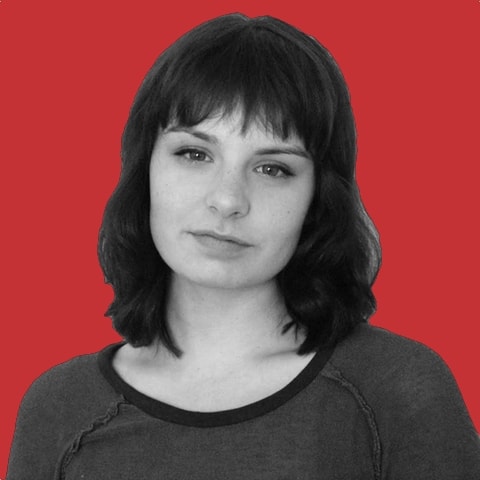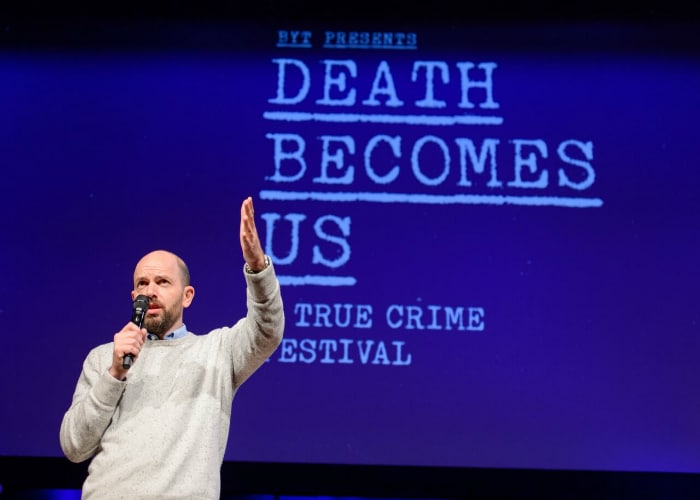
While there has been the widely successful CrimeCon in the past, Brightest Young Things wanted to specialize a gathering that embraced the pop culture aspect of true crime. They merged entertainment and education to form Death Becomes Us: A True Crime Festival that took over George Washington University’s Lisner Auditorium November 3rd and 4th. With a wide variety of talent, events, and audiences, the festival was an enriching experience that showed just how huge and diverse the true crime community is in the United States.
Before the scheduled panels for Saturday and Sunday, BYT partnered with several places in Washington DC to bring fun warm-up events building up the festival. The Library of Congress hosted a temporary exhibition of true crime books that showcased everything from Truman Capote’s In Cold Blood to illustrations of Charles Manson during trail from Charles Manson on the Witness Stand. A true crime popup bar had murder themed drinks and decorations. There was also a pre-festival meet and greet with the famous Golden State Killer detective Paul Holes. These immersive events made a more exciting experience for everyone attending if you could make it to them and they showed that true crime doesn’t have to confine audience members to auditorium seats.
The lineup for the festival covered various facets of true crime media with some former detectives like Joe Kenda, John Douglas, and Paul Holes, but also brought in podcast and Youtube amateur sleuths/comedians to talk about true crime. I attended every one except for the How Did This Get Made? panel. Each was different in many ways, so it’s impossible to talk about them without highlighting each one I went to.
Homicide Hunter: Joe Kenda
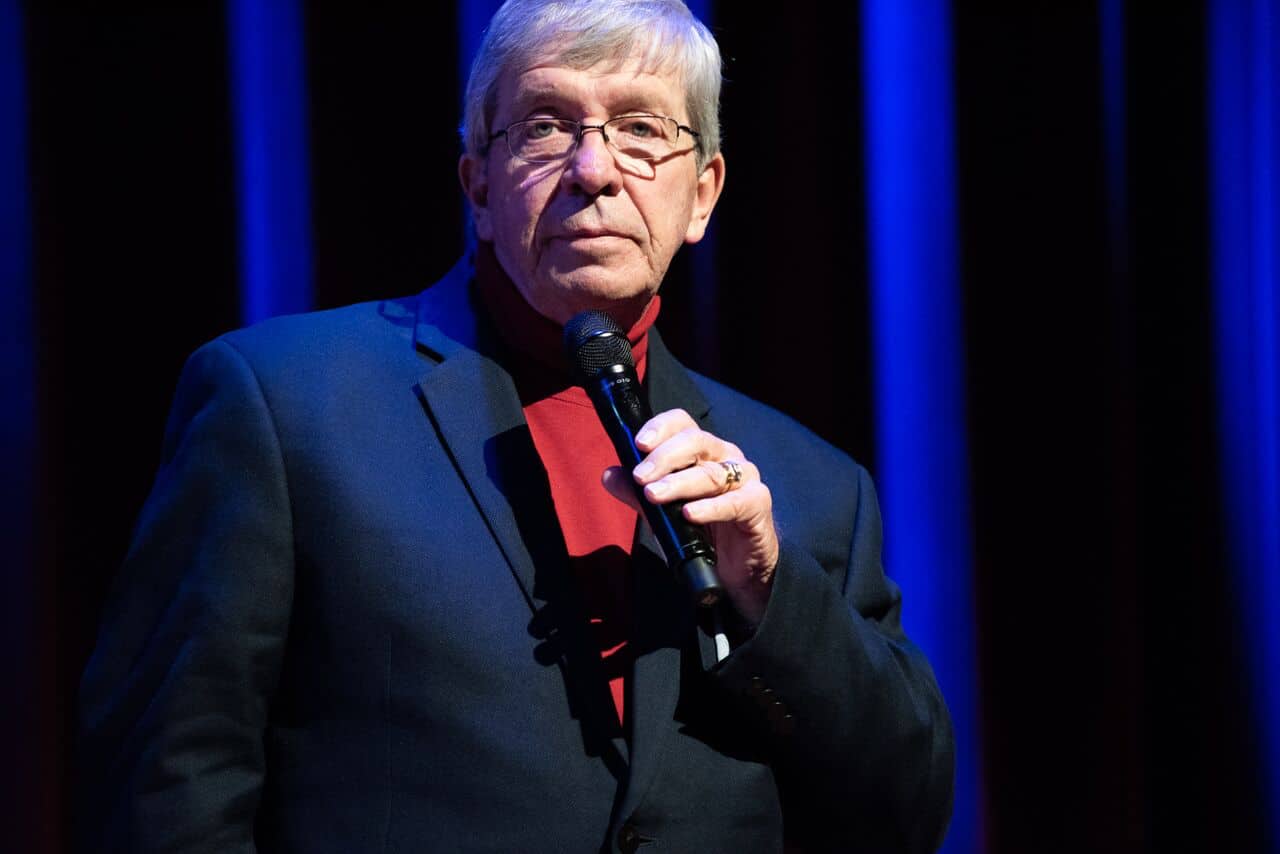
Photo by Jeff Martin & Brightest Young Things
Joe Kenda, host of an Investigation Discovery show Homicide Hunter and former Colorado Springs detective, brought the pop culture and professional aspects together to kick off the festival. The lower half of the auditorium was packed with a mostly older crowd. After showing the opening credits of his show, Kenda came out to wondrous applause alongside ID Senior Vice President Sara Kozak. Kozak’s first question was if Kenda knew he was a sex symbol, which caused a weird uproar from a lot of the older women in the crowd, whooping and hollering while their husbands sat quietly next to them. It was clear that Kenda has become more than just a detective now that he’s had his own show on ID. He’s a television personality as well.
Women continued to yell out after Kenda spoke throughout the whole panel, making comments like they would if they were watching him on their televisions at home. When Kenda frankly spoke about all the horrible murderers he caught mostly by his detective intuition, the crowd responded to his plainspoken way of talking about the atrocities he witnessed as a detective. Kenda described the eerie quietness of a crime scene, quiet because there was nothing alive there. He spoke on catching killers that murdered people he knew, which were cases that stuck with him. Perhaps the older women loved him for his black and white view of justice–he knew the bad guys and he arrested them. He’s the comfortable sort of true crime that hopes to remind us that there’s lawful good in the police department. While the targeted audience was above my age, Kenda was an informative guest that spoke from years of experience that few have.
Buzzfeed Unsolved: Ryan Bergara and Shane Madej
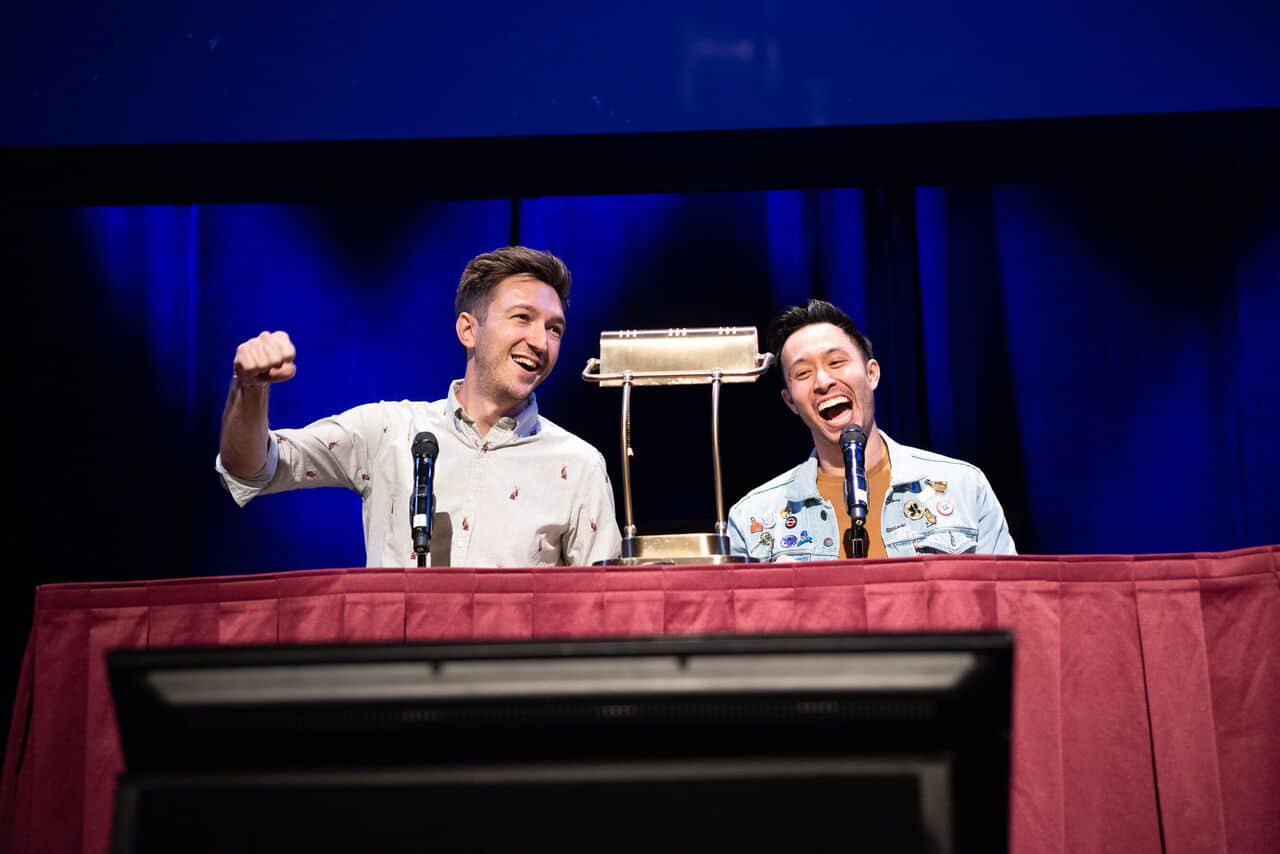
Photo by Jeff Martin & Brightest Young Things
The line for this panel wrapped around the auditorium and it was noticeably different from the last. Since Buzzfeed Unsolved is a Youtube channel, it’s expected that their audience was much younger than the last. However, they were just as enthusiastic about the show as the older women sitting in the audience before them. If you’re like me and have never seen the show, Ryan Bergara believes in conspiracy theories and the supernatural and he brings along his cynical non-believer friend Shane Madej to try to prove the existence of ghosts while visiting haunted places like Eastern State Penitentiary.
They also discuss unsolved true crime mysteries and conspiracy theories on their show, but for the True Crime Festival, they hosted a live Post-Mortem Q&A about their last supernatural episode. For almost two hours, people crowded the aisles to ask questions about the boys, make inside jokes, give them handmade gifts, and request hugs. One thirteen-year-old criticized their tactic in telling the “ghosts” the guys tried to film in their last episode that they would be on YouTube. People who enjoyed the show were already big fans of the show and that’s what the live show seemed to be catered toward. There wasn’t really anything about true crime, but a little side facet of true crime that resides in the supernatural. Bergara and Madej are complete opposites (either in real life or just for the bit) and that made for some fun comedy at times throughout the show. If anything, the panel did make me want to watch the show just to know what the hell people were referring to throughout the show when I was lost.
Wine & Crime: Kenyon, Amanda, and Lucy
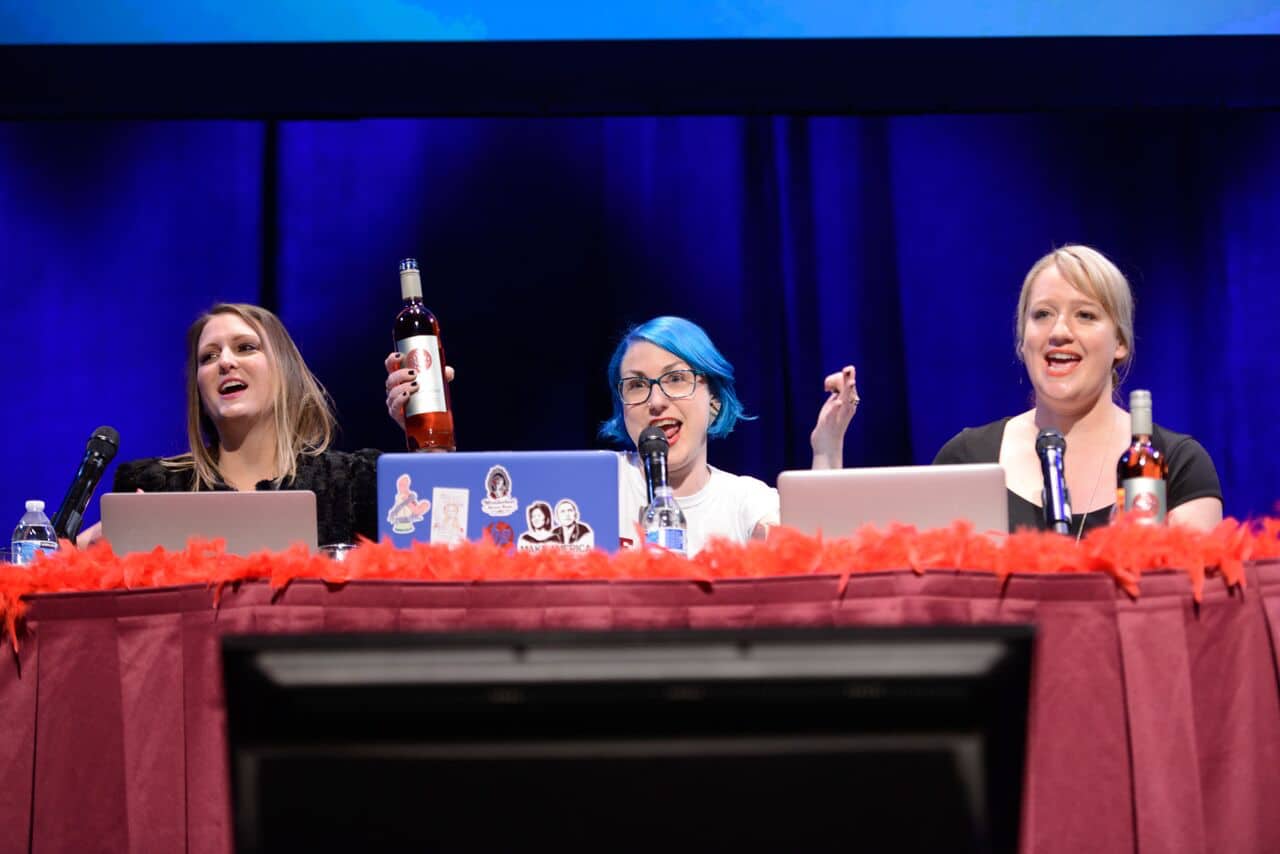
Karlin Villondo Photography & Brightest Young Things
Even though I had never listened to the ladies’ comedy crime podcast, this was undoubtedly the most fun I had all day. To give you a short and sweet (like the nasty pink wine they drank) explanation of the podcast, Wine & Crime’s tagline is: “Join three childhood friends as they chug wine, chat true crime, and unleash their worst Minnesota accents!” They bicker, quip, and laugh their way through telling murder stories, never shying away from a chance to bash the patriarchy.
The ladies chug a different wine for each episode they do and this time drank a pink wine they all described as “liquid Jolly Ranchers.” Lucy started the show off with a hilarious history of DC, which many people (Donald Trump) refer to as a swamp. She undoubtedly proved it was not a swamp, but pretty smelly. After that, Kenyon and Amanda each told the stories of two murder that fit their theme of swamp murders. The first was about the murder of a British man by his girlfriend’s jealous ex-boyfriend. Amanda then told the story of how Michael Jordon’s father was killed and thrown into a swamp after being robbed in his car. The chemistry between these ladies is unmatched by other true crime podcasters. I spent most of the panel laughing that I barely took any notes. Think of when your one aunt drinks too much at Thanksgiving and starts telling family secrets, but if those family secrets were dead bodies preserved in bogs and the geographical history of Washington DC. That’s what this show was like. I can’t wait to binge their podcast and maybe attend one of their future live shows!
Mindhunter: John Douglas
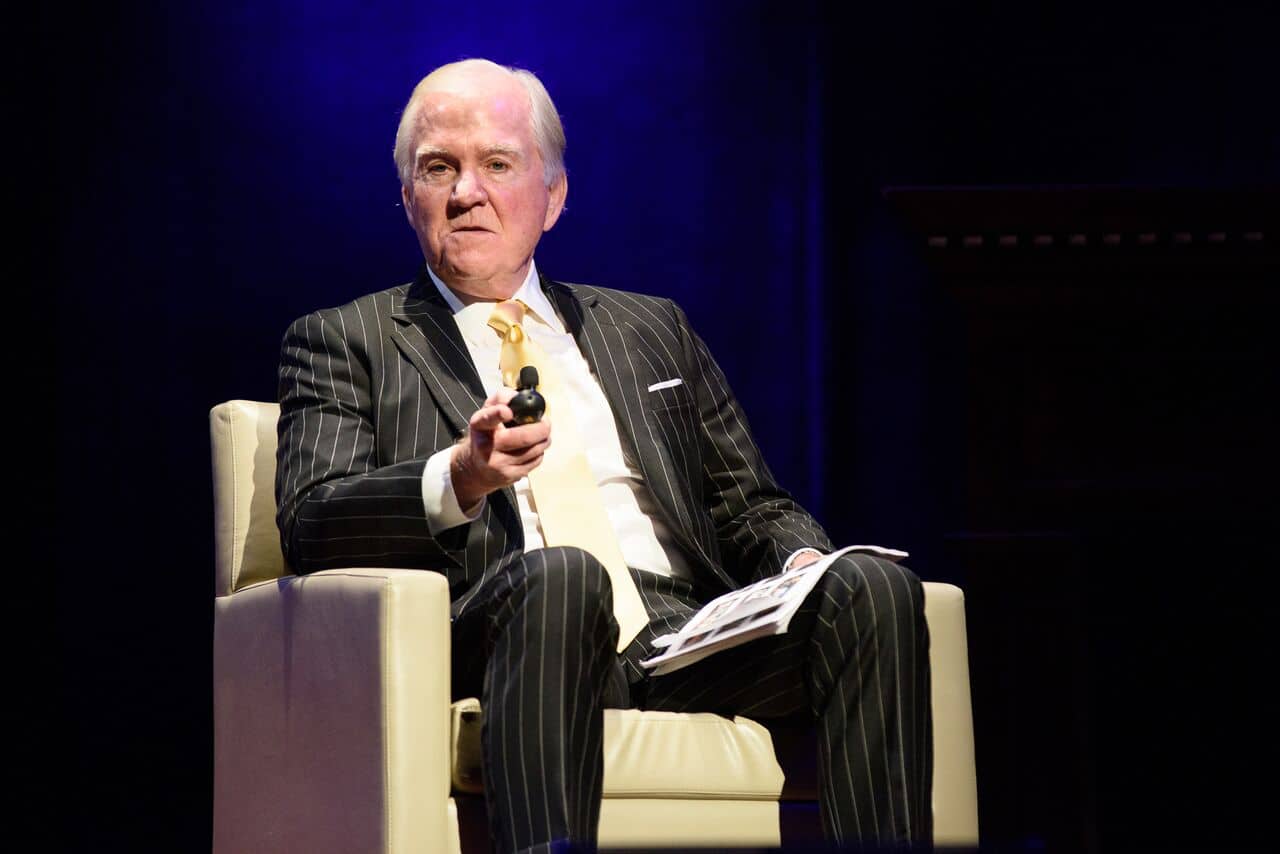
Karlin Villondo Photography & Brightest Young Things
This panel really brought the nerd student out in me. It was the most interesting lecture I’d ever attended. John Douglas is the quintessential FBI detective that interviewed serial killers and other criminals in the 1970s to help understand the minds of the country’s worst killers. Douglas’s book Mindhunter: Inside the FBI’s Elite Serial Crime Unit was recently turned into the hit Netflix series Mindhunter directed by David Fincher.
Douglas spoke about his life during the time that’s depicted in the show. He interviewed several of the countries worst murderers, including Ed Kemper and Richard Speck. He gave chilling specifics of talking to those men without ever talking notes. Douglas had always been interested in the why behind human behavior and while most of the FBI and police did not like the work he was doing in the 1970s with these killers, he was determined to figure them out. His work is still monumental and incredibly fascinating. One thing that stuck out was his criticism of criminal psychiatrists that refused to review their prisoners’ files when treating them, therefore never knowing them completely and often mistaking that they were rehabilitated. He also provided his opinion on high profile cases like the JonBenét Ramsey case, which he claimed the evidence showed the parents couldn’t have possibly murdered their daughter.
John Douglas spoke about the similarities and differences of his life and what’s depicted on Mindhunter. He joked that there were no sex scenes in his book like in the show, but that the interview process in this show was very accurate. Douglas revealed that the second season will show interviews with Charles Manson and Son of Sam while also focusing on his work during the Atlanta Child Murders that hit the city from 1979 to 1981. He spoke about how detailed Fincher is in production, often requiring many takes from his actors to make sure he gets just what he imagines. Mindhunter isn’t the production Douglas was a part of. He also spoke about coaching Stanley Tucci for his role as a child murderer in The Lovely Bones. Overall, Douglas’s panel was a refreshing and informative start to the second day of the festival.
Criminal: Phoebe Judge and Lauren Spohrer
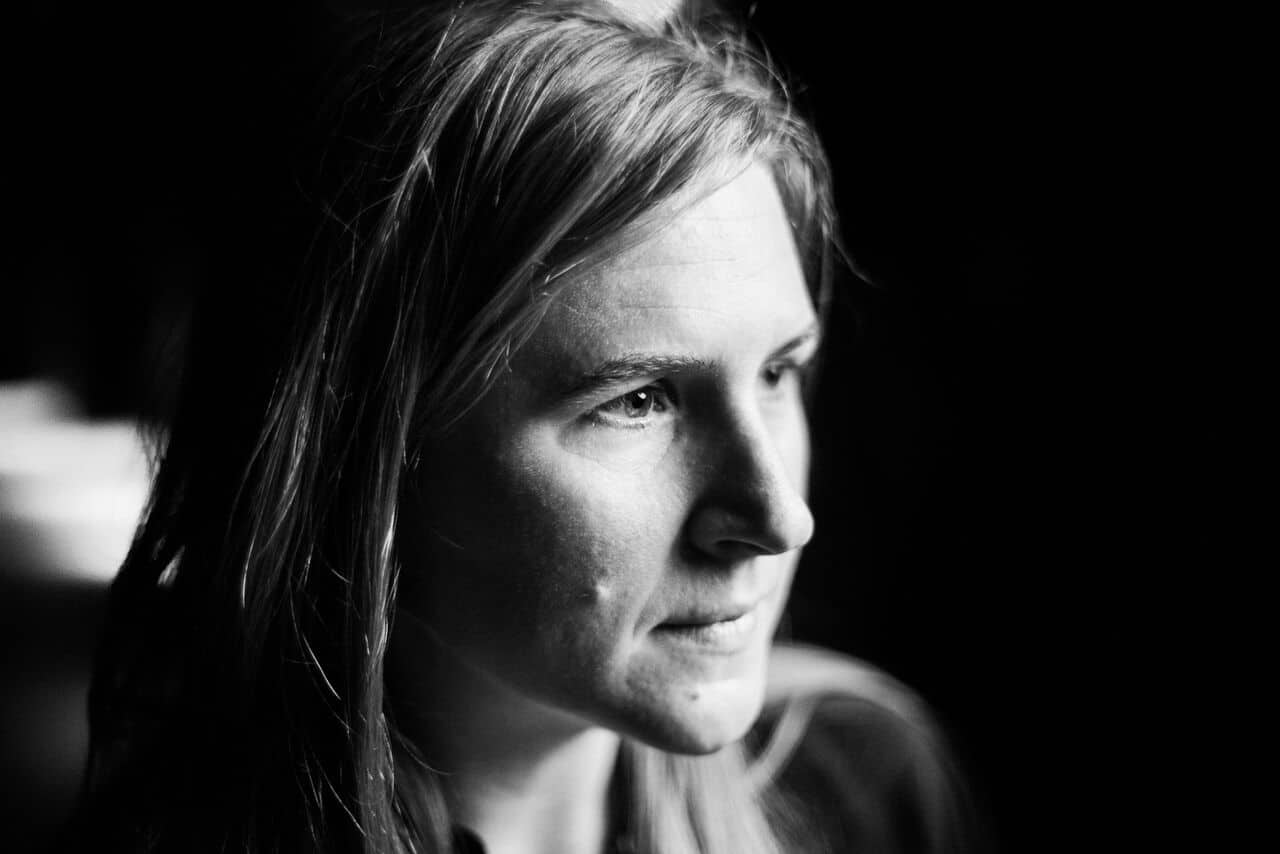
Photo by Nicholas Karlin & Brightest Young Things
One of the panels I was most looking forward to was Criminal’s live show. Criminal is one of the first true crime podcasts out there, even before Serial, but it doesn’t focus on the extremely brutal murders that most people associate with true crime. The show, created by Phoebe Judge and Lauren Spohrer after they left NPR, tells shorter stories of people involved with all different crimes and wrongdoings. Some of their past episodes have talked about a man who hijacked planes in the 1970s, a recovering drug addict, and a woman who comforts people when they choose to end their lives. Every story is well researched, heartfelt, and unlike any other stories we hear in true crime.
Criminal’s panel included three stories untold on the podcast, but likely from the rest of their live shows. The stories included a British police officer who pretended to be a dog in order to catch a criminal, the mythology of theft in the Petrified Forest National Park and the abolition of a law in Lebanon that excused rapists from prosecution if they married their victims thanks to a public art exhibition of wedding dresses. Phoebe Judge has the singular best voice for radio and podcasts. She’s relatively soft-spoken but knows how to deliver her words in the most intriguing way that’s music to your ears. It was like watching God talk when she performed on stage since I’ve been listening to her voice for a long time but had no image to match it with. Judge shifted the focus from the stories she tells to herself for a portion of the show, telling a story of her early career that was just as fascinating as the stories she researches. Along with the incomparable host, the show provided some amazing animation and visuals to go along with each story Judge told. Their stories were followed by a Q&A where Pheobe and Lauren answered some questions about themselves and their production of the show. It was the calmest crowd out of the whole festival, but also the most enjoyable to sit with. People lit up when Pheobe Judge started to speak and everyone was so gracious with each other, never fighting for the front row or to ask a question as people did in other panels. This panel was a wildly inspirational and comforting show that felt like a warm hug of beautiful humanity.
The Last Podcast on the Left: Ben Kissel, Marcus Parks, Henry Zebrowski, and Harold Schechter
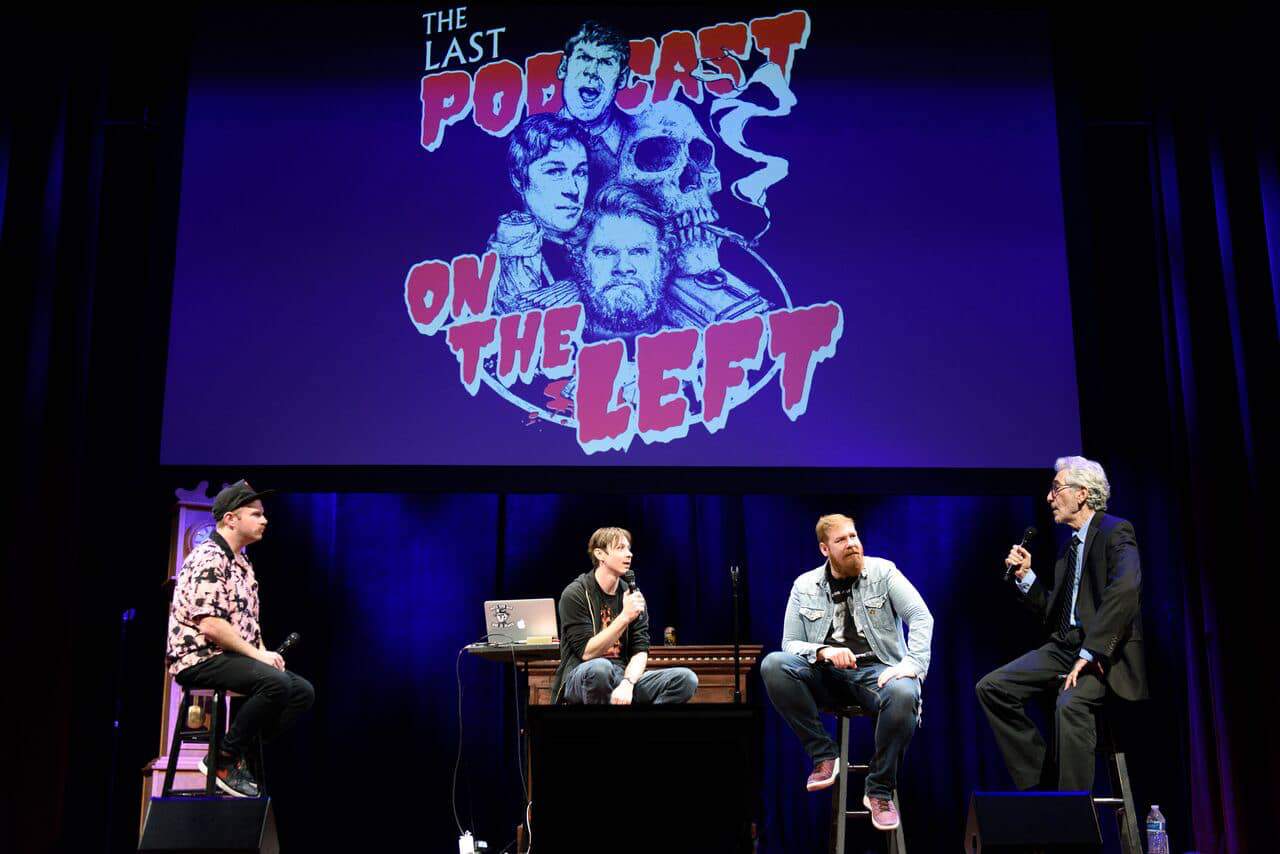
Karlin Villondo Photography & Brightest Young Things
I expected nothing shy of vulgar outrageousness from these weirdos and they did not disappoint in their sold-out show at the festival. The Last Podcast on the Left is a comedy podcast that talks about true crime surprisingly comprehensively considering their hilarious nature. They also discuss aliens thanks to Henry Zebrowski’s fascination and conspiracy theories which are a joint effort between Zebrowski and Marcus Parks. Thankfully, Ben Kissel usually reigns everyone in as they go off on funny tangents throughout their episodes.
Their live show began with the guys talking about the myth of the Pope Lick Monster, a half-goat half-man creature that people believe drew people to their deaths on train tracks by sounding like the voices of their loved ones. After that Zebrowski changed into his Mufon UFO Network agent to discuss two videos of alien sightings while Marcus rebutted them with weird videos suggesting his theories were bullshit. Then, the guys went into a detailed presentation showing that Casey Anthony killed her daughter because she was part of the MK Ultra project along with O.J. Simpson. In between, the guys talked about Pornhub, endorsed Mandy, and their hatred for the president.
Eventually, they welcomed their guest on the stage, true crime author and academic Harold Schechter. He has written several books on serial killers, including Ed Gein and H.H. Holmes. It was truly entertaining watching three goofballs have a serious conversation with a real expert on stage, but Schechter was surprisingly funny and could quip along with the comedians. He left the stage and his very uncomfortable wife left the audience then the guys used the scientific method to prove that men with small dicks become serial killers while men with big dicks become cult leaders as their finale, because what else could you expect from them? Their set was fun and just what the festival embodied: an intersection between the weird, hilarious aspect of true crime culture with the professional side.
Cold Case Files: Paul Holes, Yeardley Smith, and Zibby Allen
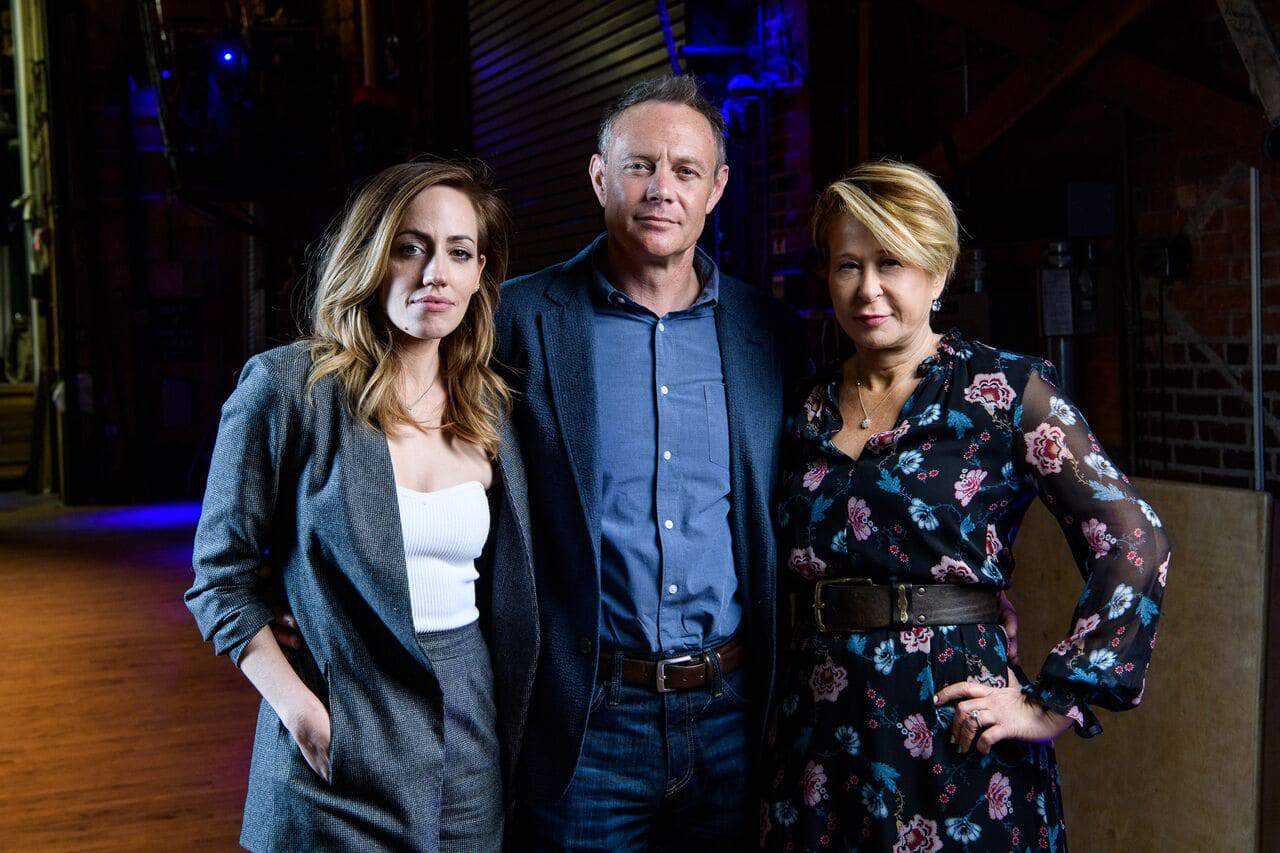
Karlin Villondo Photography & Brightest Young Things
The whole festival built up to this one last show, the conversation about the most historic development in true crime this year–the identification of the Golden State Killer. The man who worked on the case frustratingly for 24 years, Paul Holes, talked about the case in new detail. He has a book detailing the investigation of the Golden State Killer case on November 15th called Evil Has a Name. Asking Holes the questions all of the audience was wondering was the leading ladies of the Small Town Dick‘s podcast, Yeardley Smith (popularly known as the voice of Lisa Simpson from The Simpsons) and Zibby Allen (also an actress who has appeared in Bates Motel, Grey’s Anatomy, and more). Their podcast is one of the best true crime podcasts in that it also features active detectives discussing cases they worked on themselves. The detectives on Small Town Dicks, brothers Dan and Dave, were also present for the panel, but they remained behind the curtain to protect their identities so that they may continue to solve crimes outside of their podcast.
Paul Holes has recently become widely popular in the true crime world for his involvement in the Golden State Killer case, but his personality is what has cemented him as a true crime celebrity. Unlike other former detectives like Joe Kenda, Paul Holes never boasts or brings the conversation to himself. He focuses on his work and the duty he takes very seriously as a detective. You can tell in the way Holes speaks about this case and his other work that he doesn’t desire attention for what he’s done, but is happy to share the details shed light on these crimes to hopefully prevent them from happening in the future. Along with his new book coming out, Holes also signed a deal with the Oxygen network to help with programming true crime shows in the network’s effort to rebrand itself.
During the panel, Holes answered Zibby Allen and Yeardley Smith’s questions about the investigation. He described detailed theories about specific rapes and murders by the Golden State Killer that have developed now that they can name Joseph DeAngelo as the man who raped and murdered so many throughout the 1970s and 1980s. Holes also spoke to his surprise when he finally saw the man he had been hunting for decades of his career. He admitted that he imagined the Golden State Killer to be a powerful Alpha male presence, but once they caught him Holes found him to be a “wuss.” With details of the GSK case, Holes briefly spoke about other famous cases he worked on during his career, which included the death of Laci Peterson and the kidnapping of Jaycee Dugard. It was so fascinating to hear Holes talk about everything he learned and gained from all the cases he worked on throughout his life.
In their first live appearance since starting the podcast, Smith and Allen were a great pair to have lead the conversation with Paul Holes. They reacted to his details of the case and everything he shared with the audience in the same way that most of us would and that validated how we felt as an audience. Dan and Dave also asked great questions from a detective’s point of view that enriched the conversation.
Overall, this festival was incredibly fascinating to attend. I met some great true crime fans that really changed the way I think about true crime. Death Becomes Us showed that doesn’t have to be a solitary or secret interest like everyone previously thought. It can be a community gathering of people who love to solve puzzles, want to know the answers to the world’s atrocities, and like to talk about murder. Each audience brought a different subset of people, showing the true crime community is as vast and multilayered as the term true crime itself. This festival also brought together tons of talented people who are passionate about what they do, whether that’s solving high-profile murder cases, understanding the minds of criminals, or just telling stories to strangers about topics they find interesting. Despite this festival’s subject being very dark at times, it was a heartwarming experience to see people talk about things they love and other people enthusiastically support them. If you get the chance to go to the True Crime Festival in the future, since the creators do plan to continue this festival, absolutely jump at the chance to go and meet people who love true crime just as much as you do.
Related Topics: podcast, True Crime
